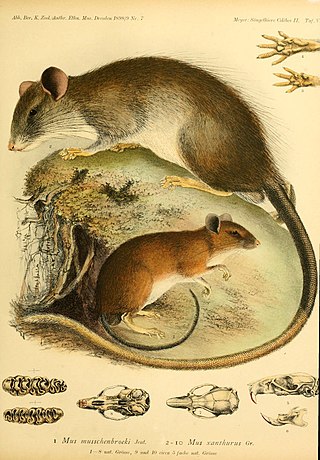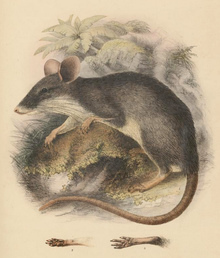Sommer's Sulawesi rat is a species of rodent in the family Muridae from Sulawesi. It is the only species in the genus Sommeromys and was described by Musser & Durden in 2002.
Bunomys is a genus of rodent from Sulawesi and Buton Island.
Andrew's hill rat is a species of rodent in the family Muridae. It is found only in Sulawesi and Buton Island, Indonesia.
The yellow-haired hill rat is a species of rodent in the family Muridae. It is found only in Sulawesi, Indonesia, including Lore Lindu National Park.

The Northern Sulawesi echiothrix or Sulawesi spiny rat is a species of rodent in the family Muridae. It is endemic to northeastern Sulawesi, Indonesia.
Margaretamys is a genus of rodent in the family Muridae endemic to the island of Sulawesi in Indonesia. Up until 1973, it was known from only few examples of one species. Then Guy G. Musser collected more examples of this species during his stay in Sulawesi, as well as collecting two new species. And in 1981, as part of his huge project of sorting through the then very large genus Rattus, he described these as members of the new genus, Margaretamys.
Dollman's spiny rat or Dollman's Sulawesi Maxomys is a species of rodent in the family Muridae. It is found only on Sulawesi.
The Sulawesian shrew rat is a species of rodent in the family Muridae. It is the only species in the genus Melasmothrix. It is found only in central Sulawesi, Indonesia, and is known from the localities of Rano Rano and Mount Nokilalaki.
The Sulawesi giant rat is a species of rodent in the family Muridae. It is monotypic in the genus Paruromys. The species is endemic to Sulawesi in Indonesia, where it inhabits forests at elevations from sea level to the tree line. It is frugivorous and semiarboreal. While not currently listed as threatened, it is impacted by both habitat destruction and subsistence hunting.

The yellow-tailed rat is a species of rodent in the family Muridae. It is found only in northeastern Sulawesi, Indonesia.

The Salokko rat is a species of rodent in the family Muridae.

Taeromys is a genus of rodent in the family Muridae found exclusively in Sulawesi, Indonesia. It contains the following species:

The lovely-haired rat is a species of rodent in the family Muridae. It is found only in Sulawesi, Indonesia.

The Celebes rat is a species of rodent in the family Muridae. It is found only in Sulawesi, Indonesia.

The Sulawesi montane rat is a species of rodent in the family Muridae. It is found only in central Sulawesi, Indonesia, on Mount Lehio, Mount Kanino, and Mount Nokilalaki.

The Sulawesi forest rat is a species of rodent in the family Muridae. It is found only in central Sulawesi, Indonesia. It is known only from Pinedapa, Poso Pesisir, Poso Regency.

The Sulawesi bear cuscus, also known as the Sulawesi bear phalanger, is a species of arboreal marsupial in the family Phalangeridae that is endemic to Sulawesi and nearby islands in Indonesia. It lives in tropical moist lowland forest at elevations up to 600 m (2,000 ft) and is diurnal, folivorous and often found in pairs. A. ursinus is threatened by hunting, collection for the pet trade and deforestation.
Guy Graham Musser was an American zoologist. His main research was in the field of the rodent subfamily Murinae, in which he has described many new species.

The central Sulawesi echiothrix is a species of rodent in the family Muridae. It is found only in Sulawesi, Indonesia.

Paucidentomys is a genus of rodents of a type commonly known as shrew-rats which was discovered in 2012 in a remote rainforest on the Indonesian island, Sulawesi. The genus is monotypic, consisting of the species Paucidentomys vermidax, or the edented Sulawesi rat. The Latin name may also be translated to its other common name "few-toothed worm-eating rat", referring to the fact that they have only two teeth and may live exclusively on a diet of earthworms.










